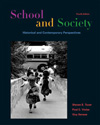 |  School and Society: Historical and Contemporary Perspectives, 4/e Stephen E. Tozer,
The University of Illinois, Chicago
Paul C. Violas
Guy Senese,
Northern Arizona University
Social Diversity and Differentiated Schooling: The Progressive Era
Professional Vocabulary- artisan craftsmanship
- In contrast to low-skill factory labor, a mode of production of goods that emphasized highly skilled labor producing and marketing uniquely individual products one piece at a time, whether in textiles, leather, wood, or another type of conversion of natural resources to handcrafted products.
- developmental democracy
- A political and educational view that values popular participation in decision making in part because such participation educates or develops the capacities of those people who participate in it.
- Dewey, John (1858-1952)
- A philosopher of democratic life and democratic education who founded the University of Chicago Laboratory School to test and develop his progressive educational theories.
- Eliot, Charles
- perhaps the most influential educator of his era; Harvard University president from 1869 to 1909; represented many of the social efficiency dimensions of progressive education.
- eugenics
- A view emerging in the latter half of the 19th century that the human gene pool should be controlled by social policy that discourages reproduction of some populations of people while encouraging reproduction among other, more desired groups.
- monopoly capitalism
- In contrast to simple capitalism, a 19th-century development that consolidated control of the market for particular goods or services in one or a few companies.
- new immigration
- The 19th-century shift in immigration to the United States from northern and western European immigrants to southern and eastern European immigrants.
- new psychology
- A loose constellation of approaches to studying the psyche and human learning; emerged around the beginning of the 20th century and emphasized nonrational, subconscious, behavioral sources of human actions rather than rational and consciously chosen sources.
- Origin of the Species
- Charles Darwin's (1809-1882) revolutionary 1859 scientific study of how species evolve over time to adapt to their environment.
- populism
- A 19th century movement in the United States that had its origins in rural life and advocated "industrial democracy," or greater local and popular control of industrial production rather than factory production organized and controlled through corporate and governmental collaboration.
- progressive educational reform
- Various and sometimes conflicting policies and practices that changed education in the late 19th and early 20th centuries from traditional, academically oriented studies for all students to different schooling experiences for different children, depending on the perceived needs of the child in the context of the perceived needs of the social order; changed the governance of schooling from local to more centralized forms of decision making.
- social efficiency
- A philosophy of centralized public policy or educational policy formation that places the good of the larger social order ahead of a commitment to full participation by all individuals in shaping that order.
- taylorization
- Named after the efficiency expert Frederick W. Taylor, a process of factory production developed in the late 19th century and early 20th century that broke complex production skills into the simplest component parts so that each worker would repeat a simple activity over and over to achieve increased productivity.
- vocational education
- The policy and practice of providing experiences that prepare people for specific occupational futures; historically implemented at the expense of a more general or liberal education that develops a range of intellectual capacities for a wide variety of political, personal, and occupational possibilities.
|
|



 2002 McGraw-Hill Higher Education
2002 McGraw-Hill Higher Education